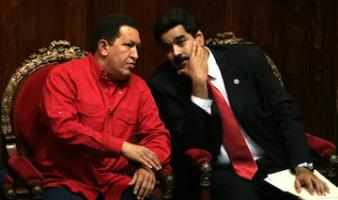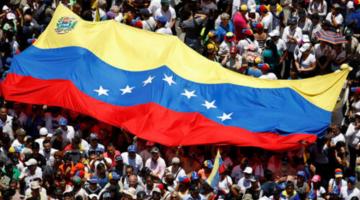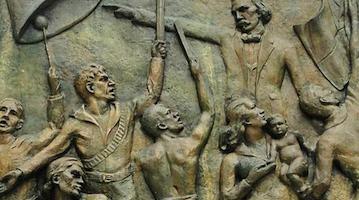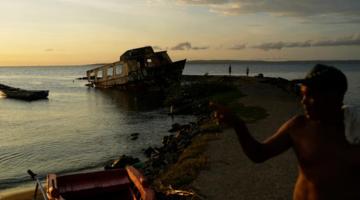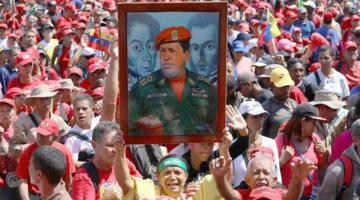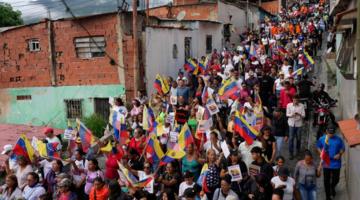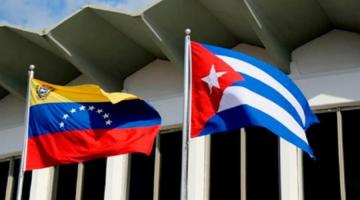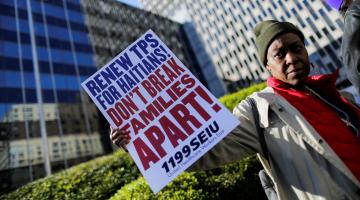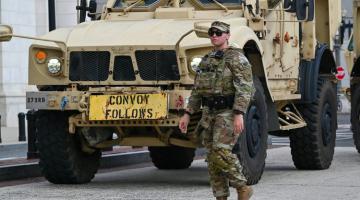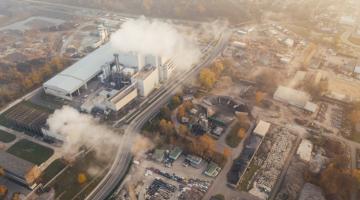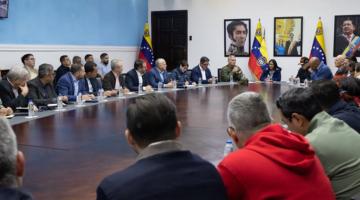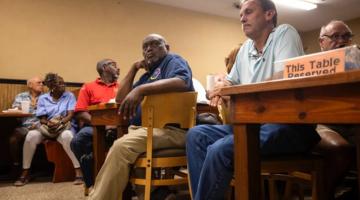“There has been divide and rule in the modern Caribbean with a vengeance, all in the interest of US hegemony over the economic, military and political destiny of the Caribbean as a whole.”
In 1984, the Antiguan radical writer, editor, and activist Tim Hector wrote a sharply critical essay on the state of Caribbean politics titled “U.S., the Caribbean, and the Future.” The essay could just have easily been published today since many of the issues that Hector demonstrates have historically plagued Caribbean society remain with us in the present. Especially when it comes to the Caribbean’s fragmentation. The Caribbean’s geomorphic formation – that is, its existence as a broken chain of islands between the North and South American mainlands – and its history as a product of English, French, Spanish, Dutch colonialism, have created a situation of both geographic separation and linguistic incomprehension.
English-speaking Antigua, Hector notes, knows nothing of French-speaking Gaudeloupe, despite their proximity – and, more importantly, despite their proximity, the two countries have little to no commercial and political ties. The same could be said of much of the Caribbean region. Hector observes that for many in the region, independence from colonialism came only reluctantly; not only were many Caribbean people happy with dependent status, most were also committed to their small-island nationalisms. As such, Caribbean integration – or what Hector calls “Caribbean Nation” – was impossible leaving the region an easy prey for the neo-colonial divide and rule policy of the United States.
And where is the Caribbean today? Cuba remains isolated and alone and Haiti has been made a Black pariah state – both by the U.S. and its regional neighbors. As of October 1, 2025, Haitian nationals will no longer be able to travel, settle, or work without a visa Barbados, Belize, Dominica, and Saint Vincent and the Grenadines – all members of Caribbean Community (CARICOM), an organization supposedly advocating for regional integration and the free movement of Caribbean citizens. Dominica will not take in Haitians, but they will accept Palestinian refugees forced from their homeland as part of the zionist genocide. At the same time, Trinidad and Guyana have become the mouth-pieces for US regime change in Venezuela, while Puerto Rico is serving as a staging ground for the deployment of US F-35 stealth fighters for a possible military attack on Venezuela. Regional integration – Hector’s vision of “Caribbean Nation” – looks to be further away now than it did in 1984. Yet it is a vision that is necessary to both counter US hegemony in the region and to bring about the true independence of the Caribbean and its people.
We reprint Tim Hector’s “U.S., the Caribbean, and the Future” below.
The Caribbean and the Future
Tim Hector
Fred Halliday, a well known writer on international affairs, wrote in September 1983 that in the Caribbean after independence, “Caribbean patriotism was precluded.” This, Halliday says, is the result of the fact that in all Caribbean territories after independence, “there was mass support for colonial and dependent status” and this went together ‘“with hostility to fellow islands in the region.” Worst of all perhaps, says Halliday, “there was a sustained division between the different linguistic groupings bequeathed by colonialism.” We cannot deny Mr Halliday’s arguments.
In truth it is this truncation, this sustained division of the Caribbean into English speaking, Spanish speaking, French speaking, and Dutch speaking, which allows, permits, and encourages US penetration and domination of the entire Caribbean region.
This division in which US domination of the Caribbean region is rooted presents itself in this form. About seventeen million of the Caribbean’s twenty nine million people are Spanish speaking, six million are French speaking, another five million English speaking and another half million speak Dutch or its derivatives.
Each linguistic bloc is isolated from the other, and where not indifferent, hostile to the other blocs. This presents the ideal opportunity for divide and rule. There has been divide and rule in the modern Caribbean with a vengeance, all in the interest of US hegemony over the economic, military and political destiny of the Caribbean as a whole.
Instead of creating a market out of twenty nine million — the only real basis of and for modern industry — the Caribbean with or without independence has remained petrified, frozen in linguistic blocs and therefore dependent, absolutely dependent on a dominant power like the US for both markets and capital. This dependence increases, producing greater underdevelopment, increasing misery, and precluding any kind of patriotism, let alone genuine development. Cuba, the most advanced of Caribbean countries, has reached as far as it can go outside of a Caribbean Nation. The other Caribbean nationstates are stuck, mired in a relationship with this or that colonial power, in the main, the United States.
As close as Antigua and Guadeloupe are, we know next to nothing about Guadeloupe, its history, its politics, far less its current affairs. Nothing shows up the insularity of these islands and the basis of insular dependence than this fact. Our trade links with Guadeloupe are nil, and where they exist they are for the most part illicit — fish, drugs and smuggled alcohol.
As a region, we have failed to assimilate and learn from the experience of other countries where the US has dominated in our region, once those countries are in a different linguistic bloc. The end result is that ignorant of the history of US dominance, we are compelled to repeat the mistakes.
The Haitian Experience
For instance, US penetration of Haiti and the resultant pauperisation of Haiti is little known or studied by Caribbean scholars, and is therefore unknown to the mass of the people. The English speaking Caribbean is now repeating Haiti’s error. That is why the utter delusion persists in the English speaking Caribbean among the mass of the population, that increased US penetration of these island-states would bring ‘prosperity’. It is a myth as persistent as Eldorado, the land of golden streets, but a myth which is even more dangerous for it involves the destiny of thirty million people!
Let us examine the Haitian relation to the US for a while. The US refused to recognise Haiti as an independent country, after Haiti under Toussaint made the only successful slave revolution in human history.
The US can turn and twist history, but it cannot turn and twist history to make the Haitian slaves into ‘communists’, and therefore its hostility to Haitian independence from 1804 to 1861, a period of 57 years, shows up the US’s long and continuous hostility to all attempts at Caribbean liberation. That cannot be denied or gainsaid.
One fact, established beyond doubt, is that the US itself, the product of an anti-colonial revolt in 1776, could not accept the same revolution when it took place in black Caribbean skin. Another thing is beyond doubt, any genuine attempt at independence by a Caribbean country has always provoked the implacable and ruthless hostility of the US. From Haiti in 1804, through Cuba and Puerto Rico in 1868, to Cuba in 1959, Dominican Republic in 1965, Manley’s Jamaica from 1972 to 1980, down to Bishop’s Grenada from 1979 to 1983 or even Surinam in 1980.
Be they Dutch, French, Spanish or English speaking territories, black or white, the US has always, always, been irrevocably and immeasurably hostile to any attempt at genuine independence in the Caribbean. The historical evidence is overwhelming.
But let us stick with Haiti, the better to understand our own condition and the total Caribbean position today.
U.S. Financial and Political Control
From 1847 onward, the United States had shown great interest in Haiti’s strategic position, and, with the construction of the Panama Canal, strong pressure was exerted on Haiti by the US to obtain the transfer of mole Saint Nicholas as a coaling and naval station. By 1905 the United States controlled Haitian fiscal and financial activities through the National City Bank of New York. In 1916, Haiti asked the United States “for a loan to consolidate Haiti’s debt to the National City Bank and to reform the monetary system” and also asked the US “to use its good offices in securing a modification of the contract between Haiti and the National City Bank.” The US responded to this Haitian request by an act of piracy. The US seized $500,000 in gold reserves from Haiti and sent them back to New York! The poor Haitians were made poorer and the rich US was made richer.
And this was not all. Writes the highly respected Suzy Castor, in her well known work The Occupation of Haiti: US penetration of Haiti produced “the establishment of plantation economy and the subjugation of the political apparatus to the sole and exclusive benefit of American monopolies particularly the First National City Bank.” This Haitian model of US dominance would reproduce itself in the rest of the Caribbean regardless of language.
First National City Bank of New York took over French speaking Haiti, and Gulf and Western took over the Spanish speaking Dominican Republic. At about the same time, US Mafia capital, directed by the likes of Meyer Lansky, took over Cuba in tourism, sugar and the manufacturing sector. Cuba threw off the US yoke in 1959, and has earned the remorseless hostility of the US. The rest of the dependent Caribbean has joined the US in its hostility to Cuba. The more dependent the Caribbean territory on the US the greater its hostility to Cuba, a member of its own Caribbean family.
Indeed the Cuban counter-revolution took place in the rest of the Caribbean. For the US capital which was driven out of Cuba in 1959, settled in the English speaking Caribbean, replacing or supplementing the British sugar plantation economy with US capital. This took the form of re-orienting Caribbean economies from sugar mono-culture to economies based on tourism, oil processing and bauxite mining and financial flows through off-shore banking.
Therefore the post war period saw the massive growth of US capital in the Caribbean region involved in manufacturing in Puerto Rico where US firms were attracted by low wages and tax incentives. These manufacturing concerns did not utilise Caribbean raw materials nor did they have the Caribbean as their market. The only thing Caribbean was the cheap labour. The pattern replicated and reproduced itself in the rest of the Caribbean. After 1959, American tourism in Cuba was replaced by American owned, controlled and directed tourism in the Eastern Caribbean.
Political and Social Consequences
Idiots, like VC Bird, Prime Minister of Antigua, interpreted this penetration of US capital in the Caribbean as a US rescue mission, rescuing the English speaking Caribbean from British colonialism. US ‘“rescue” and “subjugation” are synonymous terms in the vocabulary of conservative idiots.
This twist had some strange political effects. From 1951 when VC Bird launched a general strike against British Sugar Capital, he not only paralysed British colonialism in Antigua, but the British “invaded” Antigua with the Welsh Fusiliers. Bird, naturally, denounced this invasion. Bird was regarded as a Communist for his fight on behalf of Antiguan labour and against British capital and the British owned and controlled plantation economy. Bird was adamant: the poor peasants must own and control Antigua’s sugar economy and the State must industrialise and diversify the economy. That was Bird’s position up to 1960. For this the US branded him a communist, while Bird branded himself a Socialist and proclaimed the Red Flag as his anthem.
When after the Cuban Revolution in 1959 US tourist capital found Antigua a safe haven, the US removed its communist tag from Bird and Bird removed the socialist tag from himself. The Red Flag was replaced by the Star Spangled Banner and Bird became the friend of US capital and the enemy of local labour. The more Bird provided US Capital with concessions and Tax holidays the more Bird repressed and suppressed local Antiguan labour, first by manipulating his own Trade Union in the service and bribed pay of US capital. Bird even risked his own political neck in the service not of his people who elected him, but in the interest of US Capital. In order to make his union, the AT&LU, the basis of his freely elected one-party State, subordinate to US Capital, Bird fired George Walter, Donald Halstead and Malcolm Daniel, the pillars of the Trade Union in 1967. When challenged he would not relent — it was a fight to the finish. Either Bird would be in political office, with labour, local labour, totally subordinate to US Capital or, Walter and the new mass movement would be out of the Trade Union, organised in a new union and a new party.
Unfortunately the new party which arose from this: momentous struggle did not understand the nature of the struggle, and therefore it betrayed its mission when it came to power. US capital remained dominant whether this party or that opposition party came to power and local labour remained subordinate, reeling in unemployment, pauperisation and misery.
There is one other point which needs to be noted in US/Caribbean relations. In the destabilisation of Guyana under Jagan in the 60’s, the US realised that the Trade Unions were the base of political power. It set loose the Labour arm of the CIA, the AIFLD, with large sums of money, to subvert the labour movement not only in Guyana under Jagan, but throughout the Caribbean and Central America.
The end result is that the militant Trade Unions which were the result of the Caribbean upheavals of the 1930’s, and which reached its summit in the Caribbean Congress of Labour advocating re-structuring of the Caribbean economy in Caribbean unity, was penetrated by the AIFLD (American Institute of Free Labour Development — read the CIA labour arm for the subversion of the Labour movement) and these militant Caribbean Trade Unions were reduced to mere adjusters of Caribbean labour to US capital. Anti-communism became the main doctrine of these Trade Unions, which in fact meant antichange in the Caribbean. Organised Labour turned against itself in the interest of US Capital.
In fact, then US Capital had not only penetrated the Caribbean economy, but the US had, in the process, penetrated and taken over the Caribbean Labour movement, as it trained and paid the Caribbean Trade Union leaders. Such trade union leaders would serve the US in its destabilisation or subversion of the Caribbean in the interest of US dominance over the region. |
These Trade Unions turned their back on Caribbean unity, and in the interest of the US dominance in the region, they were anti-Cuba, and as such supported the US Bay of Pigs invasion of Cuba in 1961; they were anti-Dominican Republic under Juan Bosch, and supported the US invasion of that country in 1965: they were anti-Jamaica under Manley 1972-1980 and supported US destabilisation of Manley’s progressive social democratic reformism; they were hostile to the Grenada Revolution and supported the US invasion of Grenada in 1983. The betrayal is complete, not partial.
History therefore shows that the parties created by the mass upheavals of the 1930’s, and the Trade Unions which were created out of the same 1930 uprisings betrayed the people who supported these parties and Trade Unions in the interest of US capital. Thus, there is so-called mass support for imperialist domination in the region.
Dictators Emerge
This is true of Antigua, it is true of Barbados where the Barbados Labour Party and the Barbados Workers’ Union, though politically opposed to each other, are both tools of US policy and subversion of genuine Caribbean independence. The same is true of the Jamaica Labour Party and the Bustamante Industrial Trade Union in Jamaica also created in the thirties, but betraying people and country in the subversive service of US interests and domination of the region. The same is true of the Antigua Labour Party. This local political betrayal allied to US dominance produced an inferno of murder and mayhem in Guyana, in the 60’s, it produced the same mass murder and mayhem in Jamaica in the 70’s. It did the same in Grenada in the 80’s, though different in form, but similar in substance. Needless to say it did the same in Haiti, in Cuba, in the Dominican Republic. It has turned the Turks and Caicos Islands into a narcotics arena, so too the Bahamas with drugs, prostitution, gambling and the seediest aspects of western civilisation. In Central America this development of US penetration and capture of the Trade Union movement produced some of the worst dictators in world history. The Caribbean in Trujillo, Machado, Duvalier and Batista has produced some outrageous dictators but of the same political mix — US Capital and a captive trade union movement. The more US dominance increases in the region the more dictators in the Somoza and Duvalier mould will emerge.
Antigua is definitely headed that way — the way to a Constitutional dictatorship. Already Papa Bird resembles Papa Doc Duvalier. Later Papa Doc would be followed by Baby Doc. Likewise in Antigua Papa Bird will be followed by Baby Bird — the pauperisation and brutality will increase under US tutelage, US militarisation, US penetration and US dominance. Those are the inevitable consequences. Not me, but history shows this to be so.
Unless and until the people intervene in this course of events in their own interest, and to re-make and unite the Caribbean region, the entire archipelago, including all linguistic blocs from the Bahamas to Guyana will continue to degenerate into totalitarian rule. The process of change involves and includes the re-construction of political parties and Trade Unions, a re-definition of their aims and purposes, their democratic organisational structures.
It involves and includes, above all, uniting the mass forces for change across the seas and transcending linguistic barriers. The end result is a Caribbean Nation.
Tim Hector, “The Caribbean and the Future,” Race Today: Voice of the Black Community in Britain 15 no. 6 (July-August 1984).


